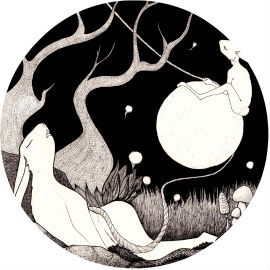I have an abiding fascination for found writing. It features in my last published novel (an obsession I gave over to a character); something I thought I might write about, and then be done with. As it turns out, the addiction is appeased, but not eradicated.
It’s true, at least, that I no longer pick up and keep every stray bit of paper, every lost or discarded shopping list I find. For one thing, preserving all the detritus of the world’s writers requires more storage space than I can afford. And then there is the matter of cataloguing and preserving all that material. To what end, exactly? These intriguing fragments, these objet trouvé, don’t have much historic or aesthetic or, perhaps, even literary value.
For me, their attraction is in their whimsicalness, and in their unselfconscious beauty. The way in which a broken, ungrammatical, half-formed sentence, a list of promises, are suggestive of something larger, and more beautiful and strange, than a more considered, complete piece of work.
They are broken, and partial, and mysterious, and like most partial things that will never be complete, their appeal lies at least partly in the magnificent ghost of their incompleteness: not what is there, but what is missing. They are expressions of possiblity, of mystery. And a lot of them are curiously intimate. A discarded note is often intringuing to me partly because it makes no sense, because the author and audience are unknown, and I am listening to them speak to each other in a secret, compacted, often incomprehensible shorthand. It is like listening to a radio broadcast in the car while driving through tunnels, losing signal, hearing voices stutter out strange syllables between long, hissing strings of white noise.
No – that’s not it – it’s like that scene from the opening of the film The Conversation, in which two people are walking in a park and their conversation is being recorded from afar, but there is a lot of interference, and they are talking about things that – as the viewer/listener – you have no context for understanding. Their voices crackle and subside beneath white noise, the chatter of the crowd, the interference of footsteps, movement, music, dogs barking. They are unaware that they are being recorded, and this unawareness seems to make their conversation unaffected, non-performative. And the recording – the film – seems unsure of its focus for a long time: the focus wanders, and we wander with it. The conversations we hear fragments of while the voice recorders and cameras seek out the focal characters seem to me like found writing. Incidental, not what we were actually seeking out, but distinct and strangely compelling, absurdly meaningful.
In the library on Tuesday I found a small pile of notes. Yellow slips of paper, held together with a tiny white bullclip. The slips are numbered, and seem to be the kind of notes you might make if you were giving a talk: palm cards, we used to call them. Each with a dot point or two to remind us what we are supposed to say.
The writing on them has a peculiar, poetic quality. One of the cards reads:
Unable obtain better life yearned
(quote)
Structure repeat nothing change
Even want change, stay same
Another of my favourites reads:
Before one of the repetition sister’s orientation-
Reveal sister bully most but loved
(Quote) because love
Straight after followed (quote)
Shock ecpect show kindness
Enforce no mercy tight situation
(quote)(quote)
link
I’m not the first person to develop an affection for found (or lost) writing. There are whole websites devoted to the collection, display and admiration of found writing and objects. One of the originals is Found Magazine, but you might also like object not found, which includes galleries of found notes, letters, stray emails and text messages, postcards and so on. Some pricelessly beautiful/absurd pieces like this:

In one sense, Shaun Tan’s visual story from Tales from Outer Suburbia: ‘Distant Rain’ is a delicate celebration of the pleasures of written ephemera. The work is partly a collage of all kinds of pieces of ‘scrap’ paper, with phrases and words written in a range of people’s handwriting. Tan writes about this story:

‘Distant Rain’ by Shaun Tan
This idea began when I was thinking about Jewish stories of the Golem, an artificial being made of clay that could be animated by spoken or written words (‘golem’ in Hebrew means ‘shapeless mass’, also ‘unformed’ or ‘imperfect’). This lead to the idea of a being made out of words – particularly those written on scraps of paper, thrown away or lost [Shaun Tan]
In my personal collection of found writing I have endless shopping lists and love letters. It’s curious that these two genres seem the most disposed of forms of writing you find on the street. Other bits and pieces I frequently come across include photographs, baby shoes, toys or parts of toys, jewellery and buttons. These objects are sometimes cool, intriguing or strange, but I don’t keep many of them. It’s the writing that most calls to me. It is like the half-heard whispers of a world’s worth of dreamers. Nonsense and ordinariness, and a strong sense of something profound, almost heard.

You have such an amazingly beautiful way of writing and seeing the world. I love knowing that there is something unique that fascinates you. Thanks for sharing :-) Neen